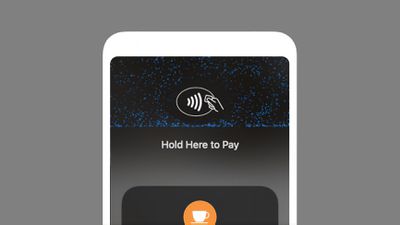iOS 15.4 Beta 2 Adds 'Tap to Pay on iPhone' Framework
The second beta of iOS 15.4 adds code for the new "Tap to Pay" feature that Apple announced this morning. "Tap to Pay on iPhone" is designed to allow NFC-compatible iPhones to accept payments through Apple Pay, contactless credit and debit cards, and other digital wallets, without requiring additional hardware.

Tap to Pay on iPhone is enabled in the latest beta, but it does require third-party providers to add support, so it is not yet available for use. There are no outward-facing signs of it that are visible to end users, but there's a new "PaymentReceived" sound file and images that show off the Tap to Pay interface.
MacRumors contributor Steve Moser has also discovered references to a "ContactlessReaderUIService" in the code, as well as mentions of alerts that end users will see. The feature will support reward passes and refunds.
- iPhone ready to accept a contactless payment.
- Hold your card or device to the seller's iPhone and wait for the success sound.
- To accept contactless payments, turn on NFC and try again.
- The payment timed out for your security. Try again when you are ready to accept a payment.
- Multiple reward passes applied
- Pay %@ %@
- Refund from %@ for %@"
- Try Again & Hold Card Longer
- Use your iPhone to accept payments from contactless credit and debit cards, Apple Pay, or any other contactless payment devices.
The Tap to Pay feature will work with the iPhone XS or later, and will allow supported iOS apps to accept iPhone to iPhone payments. At checkout, a merchant is able to prompt a customer to hold their iPhone, Apple Watch, contactless credit or debit card, or other digital wallet close to the merchant's iPhone to complete a payment over NFC.
Stripe has announced that it will be the first payment platform to offer Tap to Pay on iPhone to business customers, including Shopify users, later this spring. Apple Stores in the U.S. will also roll out support for the feature later this year.
Popular Stories
Apple turns 50 this year, and its CEO Tim Cook has promised to celebrate the milestone. The big day falls on April 1, 2026.
"I've been unusually reflective lately about Apple because we have been working on what do we do to mark this moment," Cook told employees today, according to Bloomberg's Mark Gurman. "When you really stop and pause and think about the last 50 years, it makes your heart ...
Apple plans to announce the iPhone 17e on Thursday, February 19, according to Macwelt, the German equivalent of Macworld.
The report, citing industry sources, is available in English on Macworld.
Apple announced the iPhone 16e on Wednesday, February 19 last year, so the iPhone 17e would be unveiled exactly one year later if this rumor is accurate. It is quite uncommon for Apple to unveil...
In the iOS 26.4 update that's coming this spring, Apple will introduce a new version of Siri that's going to overhaul how we interact with the personal assistant and what it's able to do.
The iOS 26.4 version of Siri won't work like ChatGPT or Claude, but it will rely on large language models (LLMs) and has been updated from the ground up.
Upgraded Architecture
The next-generation...
While the iOS 26.3 Release Candidate is now available ahead of a public release, the first iOS 26.4 beta is likely still at least a week away. Following beta testing, iOS 26.4 will likely be released to the general public in March or April.
Below, we have recapped known or rumored iOS 26.3 and iOS 26.4 features so far.
iOS 26.3
iPhone to Android Transfer Tool
iOS 26.3 makes it easier...
The iPhone 18 Pro Max will feature a bigger battery for continued best-in-class battery life, according to a known Weibo leaker.
Citing supply chain information, the Weibo user known as "Digital Chat Station" said that the iPhone 18 Pro Max will have a battery capacity of 5,100 to 5,200 mAh. Combined with the efficiency improvements of the A20 Pro chip, made with TSMC's 2nm process, the...




















